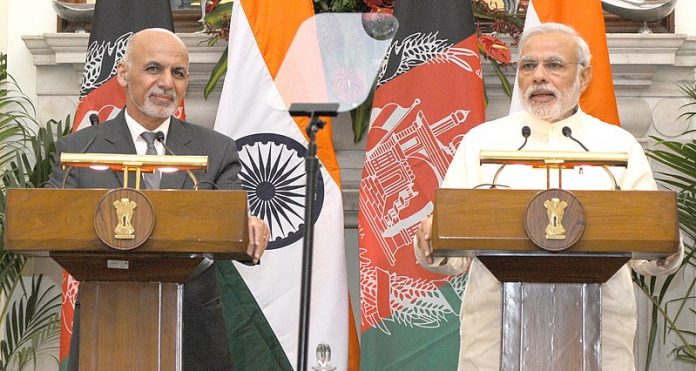The U.S.-Taliban peace deal signed in February 2020, is all set to bring fundamental changes to the regional equations under the current circumstances. The pact meant to bring peace, ending nineteen-years-long war on terror has thrown the entire security architecture of the region into turmoil. The U.S. and allied forces enjoy only limited success while return, despite spending nearly two decades and around $1 trillion in the South Asian country. Trump’s unilateral push to leave the mission unaccomplished when the Taliban tightens its grip over the country casts shadows over New Delhi’s regional calculations.
Indian Policy Objectives
New Delhi’s first and foremost priority in Afghanistan is to thwart plans to use Afghan soil for Anti-India activities. India does not want Islamic fundamentalism or religious extremism to prosper in its neighborhood as it would give rise to both internal and external security challenges to it. Given this, New Delhi fears that political instability in the war-torn country under the Taliban regime would enable Pakistan to convert it into a breeding ground of proxy war against India. Second, partnership with a propitious Afghanistan could unlock new avenues of interaction to the landlocked and energy-rich Central Asian region. Third, the war-torn Afghan state offers a litmus test for New Delhi to showcase its constructive leadership role. Besides this, Afghanistan renders a strategic option for India to monitor Pak movements and to develop strategic assets in the future if needed.
India was the first country to sign a Strategic partnership agreement with Kabul in 2011. The Indian developmental assistance worth $3 billion has generated enormous goodwill amongst the Afghan population. A poll conducted by the Afghan Centre for Socio-Economic and Opinion Research has found India as the most-friendly foreign country. But albeit of the constant requests by Kabul for several years, New Delhi has always limited its support to Kabul in humanitarian and developmental assistance.
There are clear reasons behind this restrictive stance. India is skeptical of the fact that any attempt to equip Kabul with hard power would drag it into the confrontation between the Taliban and the U.S.-led forces. New Delhi thinks this could offer fertile ground for Pakistan and ISI to cultivate Anti-India sentiments in Afghanistan. New Delhi, on the other hand, does not wish to provoke Islamabad to that extent, taking the strategic depth and leverage which Rawalpindi sustains over the deadly terror outfits like the Taliban, into account. Indian strategic authorities are aware of the ISI’s potential to take vengeance on by harming Indian installations using these proxy groups similar to the Indian consulate blast in August 2013.
However, the Indian developmental and humanitarian aid to Afghanistan has a strategic dimension of enhancing the country’s position in Afghanistan. The completion of 248 km Zaranj-Delram Highway connecting Iranian port Chabahar with Afghanistan by India in 2009 opened up new trade and connectivity corridors before the landlocked country, reducing its dependence on Islamabad. India has emerged as one of the leading players in Afghanistan through its continued and focused efforts in recent years. India has also emerged to be one of the top five donors of Afghanistan. Indian commitment to the Afghan reconstruction incorporates the construction of newly built Afghan parliament, Scholarships to 1000 Afghan students, restoration of air-links, health care assistance, dig well projects, and training for the Afghan officials and diplomats. In April, this year, India sent food and medical consignments to the country to fight the virus outbreak.
Pakistan in Afghanistan
The history of Islamabad’s engagement with the Taliban dates back to the Afghan Civil War which erupted out by the end of the last century. Contrary to the Indian interests, the political fragility in Afghan soil yield to Islamabad’s wish as its prime objective is to abolish New Delhi’s influence from the country. Pak leadership in pursuit of strategic depth views India’s growing footprints as a hurdle in this path. Islamabad fears that India-Afghanistan partnership would eventually lead to New Delhi backing Kabul’s claims in its territorial dispute with Pakistan. Pakistan, in return, alleges New Delhi’s black hands in promoting insurgency in its Baluchistan province.
In spite of being used as a trump card for over two decades, ISI’s leverage over the Taliban leadership and its offshoots remain as an ace up to its sleeve before the U.S. and the West. One of the reasons why the Taliban survived the heavy casualties, resultant of being targeted by U.S. and NATO forces for decades, is because its top order was offered a safe haven in Pak soil. Considering this, the mainstreaming of the Taliban assures a hot seat for Islamabad in the negotiation table. Moreover, when the Taliban ascents to power, taking control of the whole territory, it ensures easy deniability to Rawalpindi in proxy wars. The instability in the region is also central for Pakistan and ISI to obtain its operational funds from the West and the U.S. for anti-terrorist endeavors.
Afghanistan: The Emerging Scenario
Although New Delhi has welcomed the new peace-deal, it hardly addresses India’s security concerns. The stipulations available in the public domain include the objection to the use of Afghan soil for operations directed against the U.S. and its allies. The ambiguity remains whether India included in the framework of Washington’s allies. Under the current circumstances, the agreement appears to have positioned Islamabad in an advantageous position over New Delhi.
India, although a principal stakeholder, was largely left out of the mediation process. The Afghan government, India’s crucial ally, has been omitted from the peace talks regulated mainly between the U.S. special envoy Zalmay Khalilzad and Taliban representatives. India was put aside from the UN’s virtual meet on the Afghan peace process, partaken by nine conferees including China, Pakistan, and Russia in April this year. The Indian strategy, predominantly restricting its interaction with Kabul and its hesitancy to publicly admit the reconciliation process could have sidelined it.
President Trump, rushing to get out of the conundrum to safeguard his electoral prospect seems not to be bothered about the security and strategic implications of the proposed deal. The UN report orchestrating the Taliban still holds ties with al Qaeda is at odds with the conditions of the Trump’s peace deal. New Delhi has reservations regarding the presence of terror groups like Jaish-e-Mohammed (JeM) and Lashkar-e-Taiba (LeT) in Afghan soil, targeting Indian security interests in the region. The United Nation’s report says there are 6,500 Pakistani involved in terrorist activities in Afghanistan.
The surge in terrorist attacks even after the peace talks, particularly, the one targeting the maternity ward validates the Indian concerns. The recent attack on Gurudwara at Kabul in March, in which twenty people lost their lives mounts Indian anxiety. However, Indian leadership, smelling risk, has invigorated its efforts to carve out a more significant role in the peace process. The degree of Indian success in this endeavor and in pressing the U.S. administration to incorporate Indian interests in the negotiation framework would be decisive in defining India’s future Afghan policy.
The views and opinions expressed in this article are those of the author.

The author is pursuing Integrated MA in Political Science from Pondicherry University, India. He is also an intern at National Institute of Advanced Studies (NIAS).


